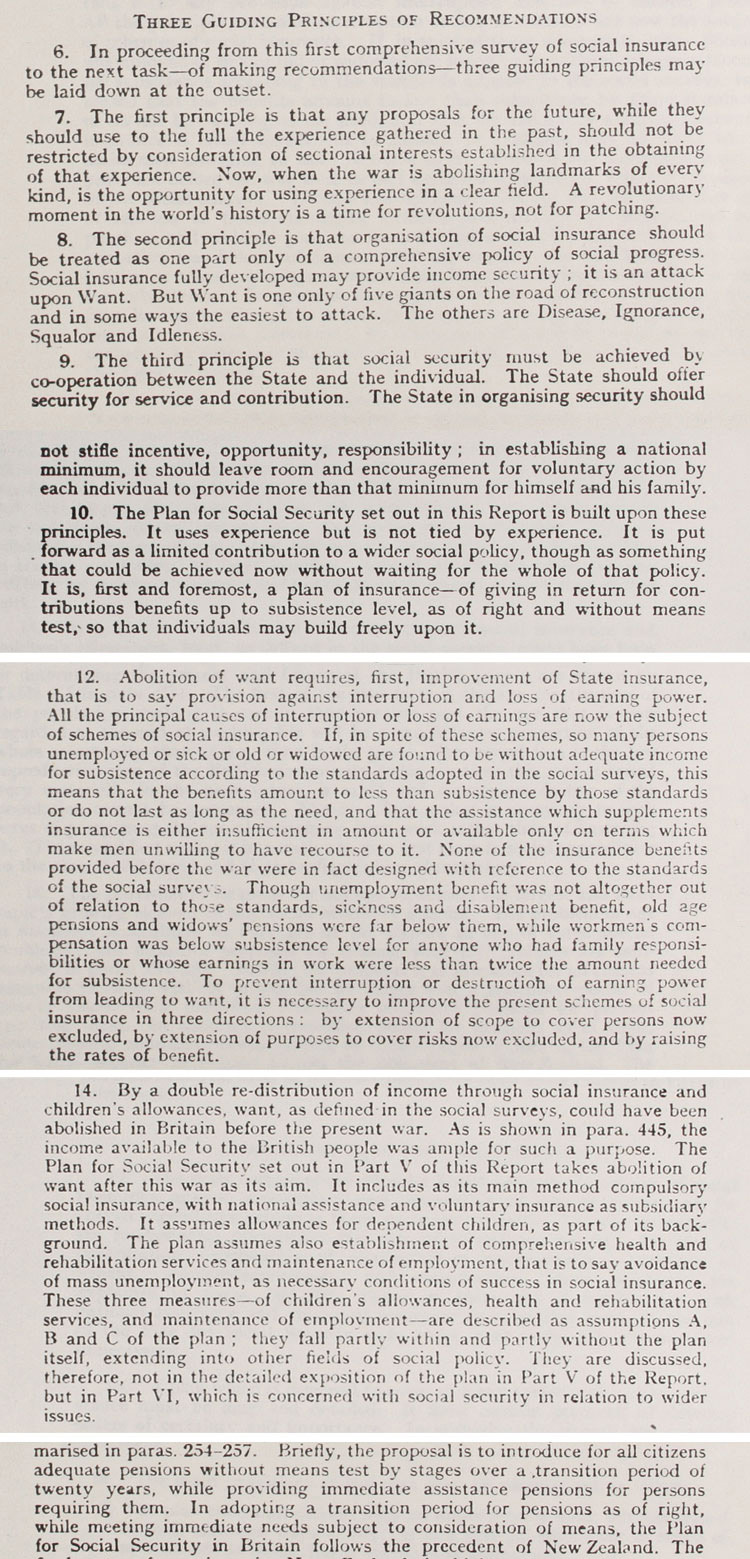
Extracts from the Beveridge Report, detailing key aims and vision, November 1942 (PREM 4/89/2)
THREE GUIDING PRINCIPLES OF RECOMMENDATIONS
6. In proceeding from this first comprehensive survey of social insurance to the next task- of making recommendations-three guiding principles may be laid down at the outset.
7. The first principle is that any proposals for the future, while they should use to the full experience gathered in the past, should not be restricted by consideration of sectional interests established in the obtaining of that experience. Now, when the war is abolishing landmarks of every kind, is the opportunity for using experience in a clear field. A revolutionary moment in the world’s history is a time for revolutions, not for patching.
8. The second principle is that organisation of social insurance should be treated as one part only of a comprehensive policy of social progress. Social Insurance fully developed may provide income security; it is an attack upon Want. But Want is one only of five giants on the road of reconstruction and in some ways the easiest to attack. The others are Disease, Ignorance, Squalor and Idleness.
9. The third principle is that social security must be achieved by co-operation between the state and the individual. The state should offer security for service and contribution. The State in organising security should not stifle incentive, opportunity, responsibility, in establishing a national minimum it should leave room and encouragement for voluntary action by each individual to provide more than that minimum for himself and his family.
10. The plan for Social Security set out in this report is built upon these principles. It uses experience but is not tied by experience. It is put forward as a limited contribution to a wider social policy, though as something that could be achieved now without waiting for the whole of that policy. It is first and foremost, a plan of insurance- of giving in return for contributions, benefits up to subsistence level, as of right and without means test, so that individuals may build freely upon it.
…
12. Abolition of want requires, first, improvement of State insurance, that is to say provision against interruption and loss of earning power. All the principal causes of interruption or loss of earnings are now the subject of schemes of social insurance. If, in spite of these schemes, so many persons unemployed or sick or old or widowed are found to be without adequate income for subsistence according to the standards adopted in the social surveys, this means that the benefits amount to be less than subsistence by those standards or do not last as long as the need, and that the assistance which supplements the insurance is either insufficient in amount or available only on terms which make men unwilling to have recourse to it. None of the insurance benefits provided before the war were in fact designed with reference to the standards of the social surveys. Though unemployment benefit was not altogether out of relation to those standards, sickness and disablement benefit, old age pensions and widow’s pensions were far below them while workmen’s compensation was below subsistence level for anyone who had family responsibilities or whose earnings in work were less than twice the amount needed for subsistence. To prevent interruption or destruction of earning power from leading to want, it is necessary to improve the present schemes of social insurance in three directions: by extension of scope to cover persons now excluded, by extension of purposes to cover risks now excluded and by raising the rates of benefit.
…
14. By a double re-distribution of income through social insurance and children’s allowances, want, as defined in the social surveys, could have been abolished in Britain before the present war. As is shown in para 445, the income available to the British people was ample for such a purpose. The Plan for Social Security set out in Part V of this report takes abolition of want after this war as its aim. It includes as its main method compulsory social insurance, with national assistance and voluntary insurance as subsidiary methods. It assumes allowances for dependent children, as part of its background. The plan assumes also establishment of comprehensive health and rehabilitation services, and maintenance of employment, that is to say avoidance of mass unemployment as necessary conditions of success in social insurance. These three measures—of children’s allowances, health and rehabilitation services, and maintenance of employment— are described as assumptions A, B, and C of the plan: they fall partly within and partly without the plan itself, extending into other fields of social policy. They are discussed, therefore, not in the detailed exposition of the plan in Part V of the Report, but in Part VI, which is concerned with security in relation to wider issues.
…
Briefly, the proposal is to introduce for all citizens adequate pensions without means test by stages over a transition period of twenty years, while providing immediate assistance pensions for persons requiring them. In adopting a transition period for pensions as of right, while meeting immediate needs subject to consideration of means, the Plan for Social Security in Britain follows the precedent of New Zealand.
